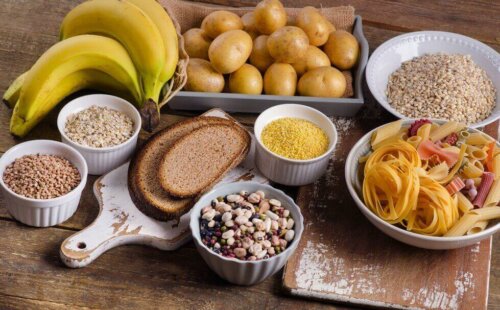7 Daily Low Carb Menus


Reviewed and approved by the pedagogue in physical education and nutritionist Elisa Morales Lupayante
Following low-carb menus is one of the trends among people who want to lose weight in a healthy manner. This is because it consists of limiting the number of foods that contain this nutrient while opting for other sources of energy such as fruit and vegetables.
Furthermore, to compensate for this reduction, you must increase the amount of protein and unsaturated fats or “good fats” in your diet. Due to their high energetic value, these allow you to stimulate the functions of your metabolism and optimize fat burning.
When compared to other dietary plans, this one only reduces the amounts of carbohydrates.
What stands out most in comparison with other diets is it suggests a wholesome diet plan. This is because it reduces carbohydrates but doesn’t entirely eliminate them.
Next, we’ll share some of the benefits and the simple rules so that you can put them into practice. Before we start; however, keep in mind that these meals should only last for 7 days. Afterward, you should follow a completely balanced diet.
Read about The Risks of Adhering to a High-Protein Diet
The benefits of low-carb menus
In a low-carb diet, the aim is to limit the consumption of foods like rice, pasta, and bread, with the goal of losing weight more easily. It’s not a restrictive diet since you include sources of complete carbohydrates, protein, and fatty acids.

Carbs are one of the macronutrients that are part of the base of the food pyramid. However, when you’re trying to lose weight, it’s important to limit the amount of these that you eat. Furthermore, you should choose foods that contain lower quantities of these.
Following a diet plan that reduces the number of carbs you eat can also provide your body with other health benefits. In fact, it’s recommended as a way to reduce your risk of cardiovascular disease that comes from obesity.
Low-carb menus: the good and the bad
Firstly, in order to follow a model low-carb diet, you must learn to identify which types of food are recommended and which ones you should limit.

Foods to include in your low-carb menus
- Eggs
- Olive oil
- Low-fat dairy
- Fresh fruit and vegetables
- Legumes and tree nuts
- Avocado/avocado oil
- Coffee and teas with no sugar
- Most spices and fresh herbs
- Lean meats (chicken, fish, etc.)
- Healthy seeds (chia, flax, sesame, etc.)
High-carb food
- Potatoes and rice
- Corn and derivatives
- Refined sugar
- Commercial fruit preserves
- Commercial chocolate and its derivatives
- Sugary desserts
- Pasta and whole grains
- Industrial sodas and beverages
- Industrial sweets and desserts
- Whole milk and flavored milk products
One-week low-carb menus

Here’s a sample menu for a whole week of low-carb dieting to consider.
Meals for Monday
- Breakfast: a cup of skim milk, then, a cup of chopped strawberries, and two cooked eggs
- Lunch: a portion of chicken or fish, then, a sliced tomato with olive oil and a portion of vegetables
- Dinner: a green salad with pieces of chicken or ham and the infusion of your choice
Tuesday
- Breakfast: a sliced grapefruit, then, one slice of whole-grain bread with peanut butter and coffee
- Lunch: a portion of grilled steak mixed salad with tomato, then, a green apple and iced tea
- Dinner: tuna with watercress salad and tea
Meals for Wednesday
- Breakfast: an omelet with red bell pepper and onion, then, whole-grain toast and black coffee
- Lunch: a portion of grilled chicken breast, then, a lettuce and tomato salad, kiwi, and tea
- Dinner: spinach salad with green bell pepper, then, cheese, and turkey ham, and the tea of your choice
Thursday
- Breakfast: strawberry and blueberry shake with coconut milk; then, a slice of whole-grain bread with fresh cheese
- Lunch: a portion of fish with herbs; then, cherry tomatoes, and avocado, and the infusion of your choice
- Dinner: one grilled hamburger patty, green salad, and tea
Meals for Friday
- Breakfast: a medium bowl of blackberries, fat-free yogurt, and tree nuts
- Lunch: a portion of pork and a salad with lettuce, tomato, and onion
- Dinner: tuna salad, a slice of whole-grain bread, and a mandarin
Saturday
- Breakfast: a cooked egg, fat-free milk, and a cup of strawberries or blueberries
- Lunch: mixed green vegetable salad with nuts, a portion of fish, and iced tea
- Dinner: two slices of turkey ham, cucumber, and lemon, and the tea of your choice
Meals for Sunday
- Breakfast: a cup of yogurt with almonds, and half a cup of blackberries
- Lunch: one portion of salmon, salad with lettuce, cucumbers, and avocado, and iced tea
- Dinner: mixed salad with pieces of turkey, tea, and half a grapefruit
Snacks
- A handful of tree nuts
- Herbal infusions
- Plain, low-fat yogurt
- Fruit salad
- Vegan “milks”
Things to consider when following low-carb menus
- Firstly, it’s possible to vary these low-carb meals with the different permitted foods mentioned above
- Furthermore, we don’t recommend skipping main meals or drastically eliminating certain food groups
- Therefore, you must consult your nutritionist or physician when in doubt
- In order to lose weight, it’s essential to eat healthily, but also to maintain other good lifestyle habits
Check out Six Ways to Use Natural Yogurt in Homemade Remedies
In conclusion
A low-carb diet is a simple model of foods that can bring you lots of benefits. Despite this, it’s not good to follow this for too long because this macronutrient is one of the main sources of energy for your body.
Finally, take into account that these types of diets must be monitored by a doctor or nutritionist at all times.
All cited sources were thoroughly reviewed by our team to ensure their quality, reliability, currency, and validity. The bibliography of this article was considered reliable and of academic or scientific accuracy.
- Barber, T. M., Hanson, P., Kabisch, S., Pfeiffer, A. F. H., & Weickert, M. O. (2021). The Low-Carbohydrate Diet: Short-Term Metabolic Efficacy Versus Longer-Term Limitations. Nutrients, 13(4), 1187. https://doi.org/10.3390/nu13041187.
- Brouns, F. (2018). Overweight and diabetes prevention: is a low-carbohydrate–high-fat diet recommendable? European Journal of Nutrition, 57(4), 1301-1312. https://doi.org/10.1007/s00394-018-1636-y.
- Chawla, S., Tessarolo Silva, F., Amaral Medeiros, S., Mekary, R., & Radenkovic, D. (2020). The Effect of Low-Fat and Low-Carbohydrate Diets on Weight Loss and Lipid Levels: A Systematic Review and Meta-Analysis. Nutrients, 12(12), 3774. https://doi.org/10.3390/nu12123774.
- Cho, Y. A., & Choi, J. H. (2021f). Association between Carbohydrate Intake and the Prevalence of Metabolic Syndrome in Korean Women. Nutrients, 13(9), 3098. https://doi.org/10.3390/nu13093098.
- D’Abbondanza, M., Ministrini, S., Pucci, G., Nulli Migliola, E., Martorelli, E. E., Gandolfo, V., Siepi, D., Lupattelli, G., & Vaudo, G. (2020). Very Low-Carbohydrate Ketogenic Diet for the Treatment of Severe Obesity and Associated Non-Alcoholic Fatty Liver Disease: The Role of Sex Differences. Nutrients, 12(9), 2748. https://doi.org/10.3390/nu12092748.
- Dieta con bajo contenido de hidratos de carbono: ¿puede ayudarte a bajar de peso? (2023, 8 febrero). Mayo Clinic. https://www.mayoclinic.org/es-es/healthy-lifestyle/weight-loss/in-depth/low-carb-diet/art-20045831?reDate=10032023.
- Ebbeling, C. B., Knapp, A., Johnson, A., Wong, J. M., Greco, K. F., Ma, C., Mora, S., & Ludwig, D. S. (2022). Effects of a low-carbohydrate diet on insulin-resistant dyslipoproteinemia—a randomized controlled feeding trial. The American Journal of Clinical Nutrition, 115(1), 154-162. https://doi.org/10.1093/ajcn/nqab287
- Holesh, J.E., Aslam, S., Martin, A. Physiology, Carbohydrates. StatPearls. https://www.ncbi.nlm.nih.gov/books/NBK459280/.
- Ludwig, D. S., Hu, F. B., Tappy, L., & Brand-Miller, J. (2018). Dietary carbohydrates: role of quality and quantity in chronic disease. BMJ, k2340. https://doi.org/10.1136/bmj.k2340.
- Paoli, A., Cenci, L., Pompei, P., Sahin, N., Bianco, A., Neri, M., Caprio, M., & Moro, T. (2021). Effects of Two Months of Very Low Carbohydrate Ketogenic Diet on Body Composition, Muscle Strength, Muscle Area, and Blood Parameters in Competitive Natural Body Builders. Nutrients, 13(2), 374. https://doi.org/10.3390/nu13020374.
- Silverii, G. A., Botarelli, L., Dicembrini, I., Girolamo, V., Santagiuliana, F., Monami, M., & Mannucci, E. (2020). Low-carbohydrate diets and type 2 diabetes treatment: a meta-analysis of randomized controlled trials. Acta Diabetologica, 57(11), 1375-1382. https://doi.org/10.1007/s00592-020-01568-8.
This text is provided for informational purposes only and does not replace consultation with a professional. If in doubt, consult your specialist.








